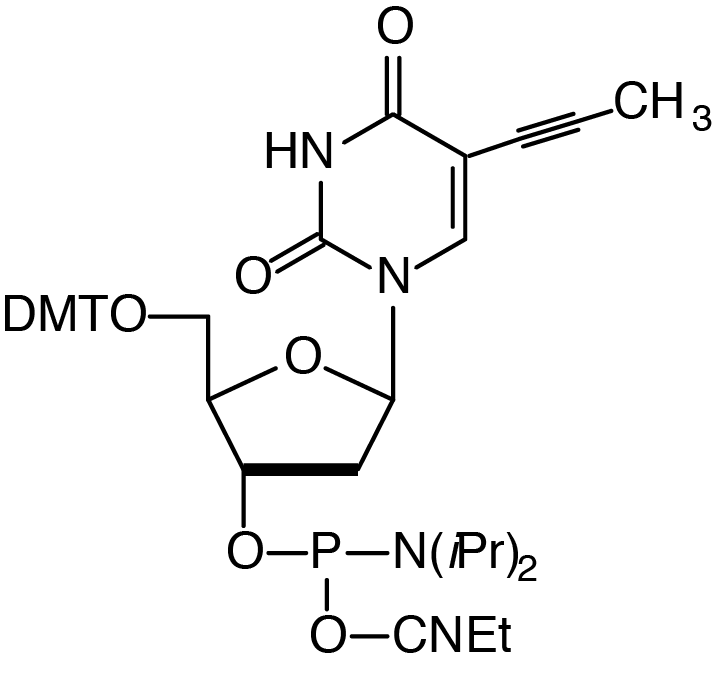
Catalog Number: 10-1054-xx
Description: pdU-CE Phosphoramidite
5'-Dimethoxytrityl-5-(1-Propynyl)-2'-deoxyUridine,3'-[(2-cyanoethyl)-
(N,N-diisopropyl)]-phosphoramidite |
| Formula: C42H49N4O8P |
M.W.: 768.85 |
F.W.: 328.22 |
Diluent: Anhydrous Acetonitrile |
| Coupling: No changes needed from standard method recommended by synthesizer manufacturer. |
| Deprotection: No changes needed from standard method recommended by synthesizer manufacturer. |
| Storage: Refrigerated storage, maximum of 2-8°C, dry |
| Stability in Solution: Similar to dA,C,G,T-CE Phosphoramidites |
| Please Note: This product is covered by patents or patents pending owned by Isis Pharmaceuticals, Inc. ("Isis"). Purchase of this product includes a limited license to use this product solely for internal research. This license specifically excludes (and you have no right to use this product for): (a) therapeutic or diagnostic applications (including products or services that incorporate this product), (b) any in vivo toxicity/safety study in support of an investigational new drug application (or foreign counterpart), (c) resale (including sale of any products or services that incorporate this product) or (d) gene functionalization activities (including products or services that incorporate data derived from gene functionalization activities) if such activities have commercial application, any and all of which require a separate license from Isis. Neither this product nor any product created through its use may be used in human clinical trials. |
| Please see Terms and Conditions of Use |
C-5 PROPYNE DERIVATIVES AND G-CLAMP
Substitution of C-5 propynyl-dC (pdC) for dC and C-5 propynyl-dU (pdU) for dT are effective strategies to enhance base pairing. Using these base substitutions, duplex stability and melting temperatures are raised by the following amounts: C-5 propynyl-C 2.8° per substitution; C-5 propynyl-U 1.7° per substitution. AP-dC (G-clamp) substitutes for dC and is another very important modified nucleoside that enhances hybridization by 7.5° per substitution. The ability of these modified bases to enhance binding while maintaining specificity has proven useful in antisense research and in the synthesis of high affinity probes. AP-dC is also a fluorescent nucleoside and should find uses in DNA structural research.
If you cannot find the answer to your problem then please contact us or telephone +44 (0)1954 210 200